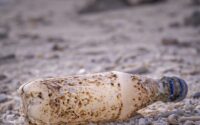The Inconvenience of Convenience
By Alexis Jones, November 12, 2021
Why do you reach for the bottle?
There are many justifications given for the use of single-use plastic water bottles such as non-bottled water is not as healthy or tastes better. The biggest is convenience. Regardless of the justification, bottled water is doing more harm than you might think.
Convenience is killing the planet and you. We’ve all got to drink water but our desire for convenience when we grab a single-use plastic water bottle is a bigger inconvenience to your health and the planet.

Is it Because of Public Health/Perception?
Single-use plastic being bad for the environment is nothing new. But with the pressure to switch to a more environmentally conscious choice, water bottle marketing companies have to be very meticulous in their marketing tactics to ensure consumers desire it.
A peer-reviewed study counters the water bottle industry’s tactic of framing tap water as a health concern by stating “under the…[EPA], municipal tap water is subject to more rigorous standards with more frequent monitoring than bottled water” (Saylor, A., L.S., & Amberg, S., 2011). “EPA regulations require fast reporting to the state when a health concern arises within a municipal water supply”, which is not the case for bottled water (Saylor, A., L.S., & Amberg, S., 2011). Misconceptions around bottled water safety need to be addressed and educated on.
“Media attention on “trust-destroying events”, such as outbreaks of illness caused by contaminated tap water, has also weakened public trust in municipal water supplies while falsely inflating confidence in bottled water” (Quoted in Saylor, A., L.S., & Amberg, S., 2011). Zion Chambers, a Gettysburg football player and frequent user of single-use plastic, believes“non-bottled water is healthier” which is the narrative pushed by these companies to sell their products.
How Do College Students Feel?
The International Journal of Sustainability in Higher Education, a peer-reviewed source, states “[a]lthough students are concerned about the environment, they do not associate their daily actions with larger environmental issues” (Choate et al, 2018).
There is a trend between education and a desire for environmental protection. My interviewees were quick to come to the answer of “convenience” when asked why they think people use single-use plastic water bottles.
However, interviewees with an Environmental Studies background said they recognize the importance of convenience but are actively working to value environmental protection over convenience. Diana Biesecker, the President of GECO, an environmentally conscious club on campus, states that in her personal life she “[makes] the environmental choice the convenient choice”. Anna Imrie, the former Student Senate Sustainability chair stated that “passion” is what motivates her sustainability efforts.
Education is one way to allow non-ES major students to have that passion. Environmental efforts “start with students” and we need to act now because “environmental concerns are becoming more concerning” (Biesecker). Biesecker also states that “everything relates to the environment one way or another. Find where it connects with your passion!”
Is environmental protection too much to ask?
From an education standpoint, no. The purpose of a college education and especially a liberal arts education is to educate students. Environmental protection is one of the most pressing issues that our nation is dealing with. Educating students on the dangers of environmental degradation and on action steps for them to do their part is a no-brainer.
Some students feel there are not enough water bottle refilling stations on campus. According to Gettysburg College’s Associate Vice President of Facilities Planning and Management, this may have been the case in the past but since 2012, he has “installed nearly 60 more stations…since the first one”. Why can’t you find a water filling station?
“Recycling” is not the solution
“Recycling is a good way to reduce waste”, but it is the last step in the reduce, reuse, and recycle cycle. There is “a widespread belief that recycling eliminates the environmental impacts of bottled water”(Saylor, A., L.S., & Amberg, S., 2011).
Too often we use recycling as a justification for convenience. This is not an effective solution as the recycling system is broken. There are inefficiencies in the system such as contamination, an abundance of energy needed to recycle, and a lack of recycling programs according to the 2019 report by The Journal of The Sustainable Innovation MBA at the University of Vermont.
Bottled water may not be good for you, but it is definitely NOT good for the planet. Pathwater reports that nearly ¾ of Polyethylene Terephthalate commonly known as PET or plastic #1 does not make it to the recycling process and of those that do, only ¼ of PET plastic water bottles are recycled. It is time we held the system and ourselves accountable for contributing to the problem.
Let’s Quantity This
Chambers uses 2 single-use plastic water bottles/day at $3 a case. 2 bottles equals 14 bottles/week, a 24 count case of water plus in two weeks, and 730 bottles/year.
$3 every two weeks may not seem that bad, but that is $78 a year that ends up in a landfill, the ocean, or as liter.
Single-use plastic water bottles are common among football players on campus. A minimum estimate of a college football team is about 100 players. The football team, at a low estimate of two bottles a day, ends up using 200 single-use plastic water bottles a day, 7,300/year and spends $780/year. “Reusable water bottles are too expensive” (Chambers). But single-use plastic water bottles aren’t? Environmental protection isn’t enough to get you to rethink your habits but is money?
Next Steps
We are humans. We have busy lives and our society is built to provide on the go convenience; therefore, convenience is always going to be a factor in our lives in one fashion or another. But guess what… we can take our reusable water bottle on the go too. Next time you reach for a single-use plastic water bottle, think about how changing small habits can add up in a big way and might actually be more convenient for our personal health and to protect the environment in the long run.
Citations
Biesecker, Diana. (2021, October). President of Gettysburg College GECO. Personal communication: in-person.
Biesecker, James. (2021, October). Associate Vice President of Facilities Planning and Management. Personal communication: email.
Chambers, Zion. (2021, October). Gettysburg College football player. Personal communication: in-person.
Choate, B., Davis, B. Y., & Verrecchia, J. (2018). Campus bottled water bans, not always the solution. International Journal of Sustainability in Higher Education, 19(5), 987-997.
Imrie, Anna, AI. (2021, October). Student Senate Sustainability Chair. Personal communication: in-person.
Nadeau, M. (2019, April 15). Single-use plastic: Why recycling is not enough. The Journal of The Sustainable Innovation MBA at the University of Vermont.
Pathwater. (2019, January 9). Do plastic water bottles really get recycled?
Saylor, A., Prokopy, L. S., & Amberg, S. (2011). What’s wrong with the tap?: Examining perceptions of tap water and bottled water at Purdue University. Environmental Management, 48(3), 588-601.


